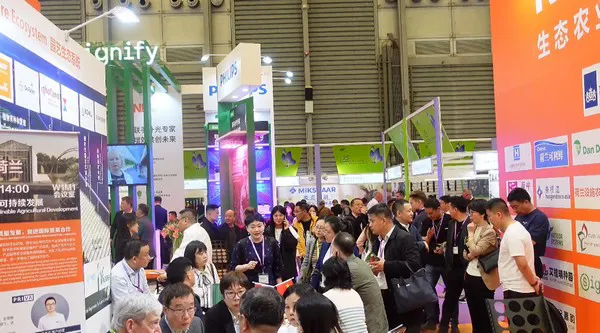This April, the 25th HortiflorExpo IPM China was successfully held in Shanghai. HortiflorExpo IPM is Asia's leading brand exhibition of flowers, horticulture, and gardening industries. In this context also, a China-Netherlands Facility Agriculture Seminar was organized.
At the IPM exhibition, more than 500 companies from 21 countries and regions participated in the exhibition. Among them, more than 30 exhibitors were from the Netherlands, and the Netherlands Pavilion was also the largest national pavilion at this exhibition. And our NL pavilion finally ushered in several new companies into China after international travel restrictions were lifted. The companies from the Netherlands participated in the exhibition covered flower breeding, flower and seed bulb trade, and companies in the entire industrial chain of facility horticulture. In the video below, you can see an impression of the exhibition.

China-Netherlands Facility Agriculture Seminar
During the exhibition, the Agricultural team of the Embassy network prepared many activities for Dutch companies. With the support of the Shanghai Municipal Agriculture and Rural Affairs Commission, we co-organized the China-Netherlands Facility Agriculture Seminar together with the Secretariat of the China Flower Association. The theme of this seminar was "Innovative Digital Agriculture Accelerates the Sustainable Development of Agriculture." At the forum, we discussed the sustainable development of High-tech Greenhouses and the application of digital agriculture. Over the past three decades, more and more High-tech Greenhouses have been introduced to China, but there have also been increasing questions about their practicality and feasibility. This forum aimed to introduce to colleagues in the industry how to improve production efficiency through innovative digital agriculture, accelerate sustainable agricultural development, and contribute to the realization of the United Nations Sustainable Development Goals.
The Deputy Secretary-General of China Flower Association, Ms. Xuemei Liu, emphasized in her speech the long-term cooperation and exchanges between China and the Netherlands in the field of the floral industry: "The Netherlands has been the number one country of origin of China's flower imports for many years in a row." In 2022, China became the world's second-largest flower exporter after the Netherlands. Ms. Dong Yan from the Information Department of the China Flower Association introduced in the report that China's flower import and export provinces are relatively concentrated. The imports are mainly bulb seedlings, and the exports are mainly cut flowers and potted plants. In recent years, the import volume has begun to decline while the export volume has been increasing year by year. We have also noticed that some areas in China with a suitable climate for flower planting have attracted and will attract more and more growers from the Netherlands to produce in China.
With the development of China's digital economy, all aspects of life are facing digital transformation. Digital applications have brought considerable changes in the development model of the floral industry and promoted the high-quality development of the industry. The wide application of digital technology and intelligent equipment has accelerated the penetration and integration of the entire production chain of the flower industry, from breeding research and development, production and planting, logistics and transportation, product sales, etc., optimized the supply chain industry chain of the flower industry, and broadened the international trade of flowers channels to further promote international economic cooperation. Professor Chen Yan, a professor and doctoral supervisor from the Beijing University of Posts and Telecommunications, proposed in his keynote speech that "in the future, we will work together to complete the vision of a comprehensive digital transformation of the flower industry and jointly provide Chinese consumers with high-quality and affordable flowers."
The operation of a High-tech Greenhouse requires a wide range of technologies and management strategies, in addition to light management, including climate control, irrigation and fertilizer management, pest monitoring, and treatment, crop growth monitoring, and more. Ultimately, the cost of growing crops depends on the ability to operate and manage greenhouses efficiently. Such professional operation and management rely on the cultivation of technical talents. Mr. Nick Hong from the Netherlands Protected Agriculture Alliance, and Ms. Ashley Wang from Food Ventures, a Dutch grower active in China, shared with the audiences on the experiences and practices of the members of the Netherlands Facility Agriculture Alliance and Dutch professional growers, hoping to facilitate and contribute to the transition from low-tech and medium-tech solutions to high-tech solutions and improve the efficiency and productivity of smart greenhouse management in China.
In his closing remarks, the agricultural counselor Wouter Verhey stressed the need to join forces to make the transition of Chinese horticulture towards a feasibly modern industry happen.
Source: agroberichtenbuitenland.nl
